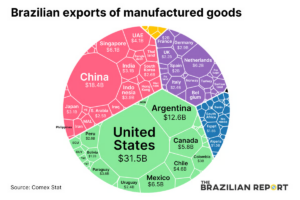Could desalination plants help de-escalate our conflicts?
Plus: Iranians celebrate their World Cup defeat, Nigeria’s Central Bank prints new notes, and Hungary’s €7.5B EU cashback is at risk
Hi there Intriguer. Beach-goers at Sydney’s iconic Bondi Beach recently found themselves surrounded by ~2,500 naked sun-soakers, who had gathered for a photo shoot to raise awareness for skin cancer. We applaud the cause and are particularly impressed by the methodology, though some innocent onlookers may be so scarred that they’d hesitate before venturing out into the sun again.
Today’s briefing is a ~4.3 min read:
- 🚰 Water scarcity: Could desalination plants help de-escalate conflicts?
- ➕ Plus: Iranians celebrate their World Cup defeat, Nigeria’s Central Bank prints new notes, and Hungary’s €7.5 B EU cashback is at risk.
📰 GLOBAL HEADLINES

🤿 DEEP DIVE
When life gives you salt, make water
In brief:
- Climate change means that more people worldwide are experiencing water scarcity, which has led to more water-related conflicts.
- Some countries are turning to desalination to convert seawater into drinking water to supplement their fresh water supply.

“Water water everywhere, nor any drop to drink”
Samuel Taylor Coleridge wrote those famous words in 1798 about a returning sailor, but he may as well have been painting a vision of earth in 2098:
- Only 3% of the water on Earth is freshwater, and as climate change increases the frequency of extreme weather events, the sources of freshwater are shrinking and risk becoming contaminated.
- According to the Intergovernmental Panel on Climate Change, two-thirds of the world’s population experience severe water scarcity for at least one month each year.
The increasing scarcity of freshwater is leading to more water-related conflicts. Between 2000 and 2019, the number of clashes involving water resources nearly quadrupled, with the highest concentration in Asia and Africa.
To address the problem, some countries – mostly in the Middle East – have turned to desalination, a process that transforms seawater into potable water.
- Israel is a world leader in the sector: its desalination plants provide 80% of its total domestic and industrial water needs.
🇪🇹 Case study: the Grand Ethiopian Renaissance Dam
In 2011, Ethiopia began building the Grand Ethiopian Renaissance Dam (GERD), a colossal hydropower project on the Blue Nile.
Despite assurances from the Ethiopian government that the $5B dam won’t impact downstream water flows, both Egypt and Sudan argue the dam is an existential threat to their water supplies.
- Analysts worry that, without a legally binding water-sharing treaty between the three countries, a future drought could lead to serious conflict over water rights.
Egypt and Sudan are already preparing for their water flows to be disrupted. Earlier this year, Egypt pledged to build 14 new desalination plants (on top of the 80 already in operation).
- More ominously, Egypt and Sudan have deepened their military ties in recent years.
The desalination craze
Access to fresh water can determine a country’s economic growth and social stability, which explains why everyone has become so thirsty for desalination.
- VCs take note: by one estimate, the size of the global desalination market will grow more than 8% per year to reach $32B by 2027.
Sadly, there’s a catch. The process is extremely energy-intensive and pumps even-saltier water back into the sea, which is bad news for our marine ecosystems.
- Then, as oceans get saltier, desalination becomes more energy-intensive and pumps even saltier water back out until it’s NaCl all the way down.
So what’s the solution? We’ll let water experts Marc-Antoine Eyl-Mazzega and Élise Cassignol lay it out:
“[T]he causes of water scarcity are multiple (climate change, intensive agriculture and demographic growth), and it will require States to rethink their water policies, which are central to the preservation of their stability, resilience and sovereignty.”
🤝 SPONSORED BY SNAKE RIVER FARMS
Celebrate the season

Receive $25 off orders of $149+ with code SWAPSRF at Snake River Farms
Whether you’re a seasoned veteran or a beginner to beef, the pioneers of American Wagyu have got you covered with $25 off your order.
🔦 REGIONAL SPOTLIGHT
Africa & the Middle East
🇮🇷 Iran
Anti-regime protestors across Iran celebrated after the United States eliminated the country from the World Cup on Tuesday night.
- Iranian players had faced threats of retribution for refusing to sing the national anthem in their opening match against England.
🇳🇬 Nigeria
The Central Bank of Nigeria has introduced new currency notes in an effort to curb inflation and fight corruption.
- The new denominations will include enhanced security features and combat inflation by bringing “hoarded currencies back into the banking system.”
🇸🇹 São Tomé and Príncipe
The government of São Tomé and Príncipe thwarted a coup attempt over the weekend, according to Prime Minister Patrice Trovoada.
- Delfim Neves, a rival politician Trovoada defeated in September’s elections, has been imprisoned in connection with the alleged plot.
🇿🇦 South Africa
South African President Cyril Ramphosa is considering resigning ahead of a corruption investigation, according to Bloomberg.
- Ramphosa denies wrongdoing but has been accused of covering up an unreported theft of millions of dollars he had obtained through corruption.
🇸🇾 Syria
According to the Pentagon, the top leader of ISIS, Abu al-Hasan al-Hashimi al-Qurayshi, has died during fighting with US-backed militants in Southern Syria.
- ISIS has named a successor to al-Qurayshi, who served as leader for less than a year.
🗞 IN OTHER NEWS…
Money feuds: Hungary vs Brussels

The news: The European Commission recommended freezing Hungary’s €7.5 B share of EU cohesion payments, designed to boost poorer European economies.
- According to the Commission, Hungary has failed to follow through on the 17 rule-of-law reforms they had pledged in September.
The accusations: Brussels has repeatedly criticised Hungary’s President, Viktor Orbán, for weakening Hungary’s rule of law and boosting corruption.
- Brussels argues it cannot accept such lax standards because they would imperil the fair usage of billions of EU taxpayer money.
The Commission’s recommendation is unwelcome news in light of Hungary’s economic condition.
- The Hungarian economy contracted in Q3 2022, while its currency, the Forint, is quickly depreciating against the Euro and Pound sterling.
But as he so often does, Orbán may yet have a trick up his sleeve. While he’s unlikely to get the funds after the European Council votes on the decision, the EU’s governance structure means Orban still has substantial leverage over the regional bloc.
- Analyst Dave Keating explains this dynamic:
“[Poland] & [Italy] may vote against [the resolution], but it has the votes to pass. In retaliation, #Orban has threatened to veto further [EU] aid to #Ukraine, including an €18 billion aid package [Ukraine] desperately needs right now. ”
🍸 GAME TIME
Somehow, it’s already December. Test your knowledge of the global holidays coming up this month! (You can also play online here.)

Answers: Across – 2. Norse 5. Eight 6. Kwanzaa 8. Dedication 9. Turkey Down – 1. One 3. Solstice 4. January 7. Bodhi 10. KFC







